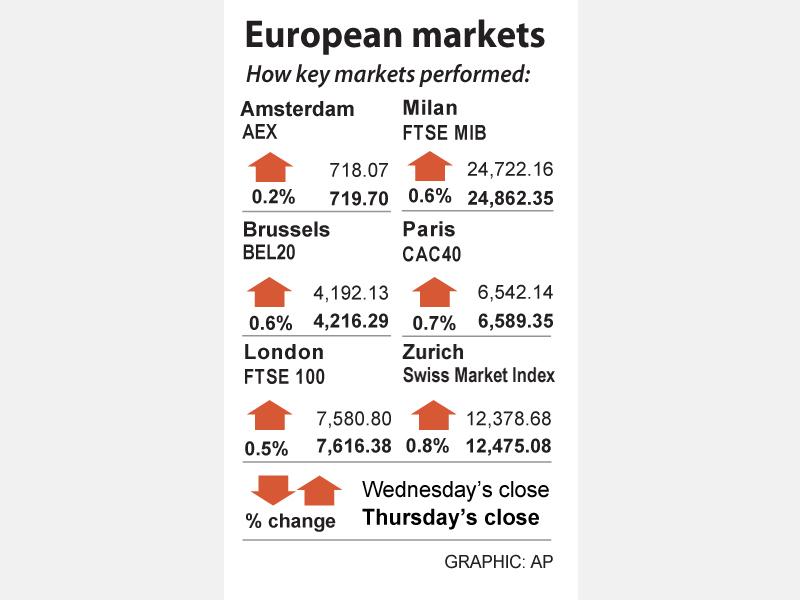European shares rose on Thursday as the European Central Bank (ECB) kept its policy stance largely unchanged and signaled a steady reduction of stimulus over the coming months, spurring money markets to trim rate hike bets for the year.
The pan-European STOXX 600 rose 0.7 percent, broadening a rise of 0.1 percent from earlier in the day, while eurozone shares advanced 0.6 percent.
The ECB stuck to its plans of finally ending its stimulus program in the third quarter of this year, but avoided mentioning a precise schedule, stressing uncertainties around the Ukraine war.

Short-dated yields and the euro were driven lower.
“With rate hikes expected to start some time after the end of asset purchases, this sequence provides the ECB flexibility and optionality for the coming months depending on economic developments,” Syz Bank chief economist Adrien Pichoud said.
ECB President Christine Lagarde said the bank would only start raising interest rates “some time” after it has ended its net asset purchases.
Money markets trimmed their rate hike bets, pricing in about 65 basis points (bps) of rate hikes by year-end from 70 bps earlier.
The ECB is facing a tough policy trade-off that is far more complex than in other developed markets, Fidelity International global macro economist Anna Stupnytska said.
“As the growth shock becomes more evident, the ECB’s focus will likely shift away from high inflation towards trying to limit economic and market distress... Contrary to market pricing, we do not expect the ECB to hike rates until the fourth quarter of this year or early 2023,” Stupnytska said.
The ECB is lagging most other major central banks, which started raising interest rates last year.
Technology stocks were the only sector in the red, shedding 0.3 percent, while battered travel and leisure stocks gained the most, with low-cost airline Wizz Air Holdings PLC jumping 7.7 percent on signs of encouraging summer bookings.
Birkin bag maker Hermes International SA gained 2.7 percent after its quarterly sales beat estimates, lifted by strong appetite for luxury accessories.
Volkswagen SA fell 1.5 percent after warning of a cloudy outlook, saying that it had started to feel the impact of the Ukraine war on supply chains and raw materials prices in the first quarter.
Worries about rate hikes, a prolonged Ukraine conflict and mixed earnings have investors concerned, causing the STOXX 600 to end the holiday-shortened week 0.2 percent lower.
European stock markets are closed on Friday and tomorrow for Good Friday and Easter holidays.

CAUTIOUS RECOVERY: While the manufacturing sector returned to growth amid the US-China trade truce, firms remain wary as uncertainty clouds the outlook, the CIER said The local manufacturing sector returned to expansion last month, as the official purchasing managers’ index (PMI) rose 2.1 points to 51.0, driven by a temporary easing in US-China trade tensions, the Chung-Hua Institution for Economic Research (CIER, 中華經濟研究院) said yesterday. The PMI gauges the health of the manufacturing industry, with readings above 50 indicating expansion and those below 50 signaling contraction. “Firms are not as pessimistic as they were in April, but they remain far from optimistic,” CIER president Lien Hsien-ming (連賢明) said at a news conference. The full impact of US tariff decisions is unlikely to become clear until later this month

With an approval rating of just two percent, Peruvian President Dina Boluarte might be the world’s most unpopular leader, according to pollsters. Protests greeted her rise to power 29 months ago, and have marked her entire term — joined by assorted scandals, investigations, controversies and a surge in gang violence. The 63-year-old is the target of a dozen probes, including for her alleged failure to declare gifts of luxury jewels and watches, a scandal inevitably dubbed “Rolexgate.” She is also under the microscope for a two-week undeclared absence for nose surgery — which she insists was medical, not cosmetic — and is

GROWING CONCERN: Some senior Trump administration officials opposed the UAE expansion over fears that another TSMC project could jeopardize its US investment Taiwan Semiconductor Manufacturing Co (TSMC, 台積電) is evaluating building an advanced production facility in the United Arab Emirates (UAE) and has discussed the possibility with officials in US President Donald Trump’s administration, people familiar with the matter said, in a potentially major bet on the Middle East that would only come to fruition with Washington’s approval. The company has had multiple meetings in the past few months with US Special Envoy to the Middle East Steve Witkoff and officials from MGX, an influential investment vehicle overseen by the UAE president’s brother, the people said. The conversations are a continuation of talks that

CHIP DUTIES: TSMC said it voiced its concerns to Washington about tariffs, telling the US commerce department that it wants ‘fair treatment’ to protect its competitiveness Taiwan Semiconductor Manufacturing Co (TSMC, 台積電) yesterday reiterated robust business prospects for this year as strong artificial intelligence (AI) chip demand from Nvidia Corp and other customers would absorb the impacts of US tariffs. “The impact of tariffs would be indirect, as the custom tax is the importers’ responsibility, not the exporters,” TSMC chairman and chief executive officer C.C. Wei (魏哲家) said at the chipmaker’s annual shareholders’ meeting in Hsinchu City. TSMC’s business could be affected if people become reluctant to buy electronics due to inflated prices, Wei said. In addition, the chipmaker has voiced its concern to the US Department of Commerce